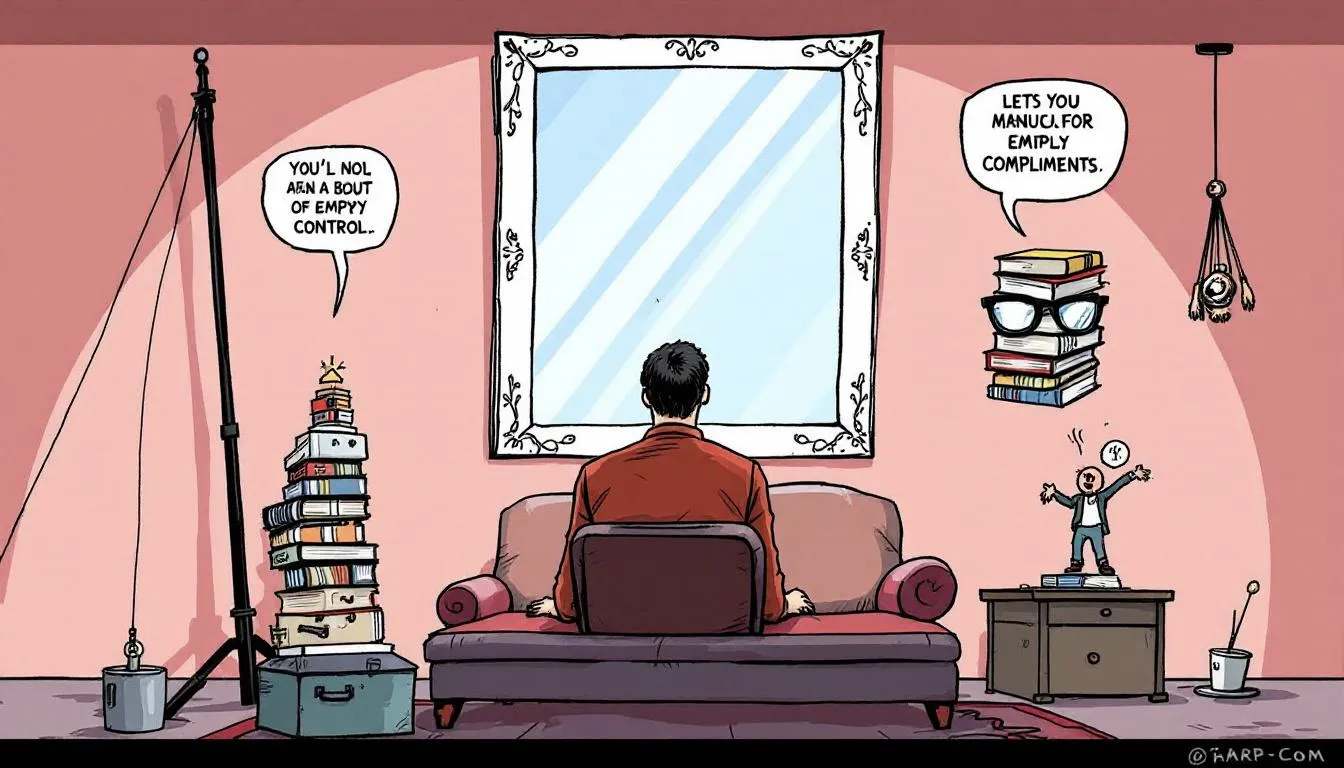Why Do Narcissists Always Play the Victim? Understanding Their Behavior & How to Respond
Narcissists always play the victim to manipulate others and avoid responsibility. This tactic helps them gain sympathy and control. Understanding why do narcissists always play the victim can help you recognize their behaviors and protect yourself. This article will explore their strategies and how to respond effectively.
Key Takeaways
Narcissists adopt a victim mentality to manipulate others, gain sympathy, and avoid accountability.
Emotional manipulation tactics such as gaslighting and triangulation are commonly used by narcissists to maintain control over their victims.
Recognizing narcissistic behaviors and setting clear boundaries are essential steps in protecting oneself and recovering from narcissistic abuse.
The Narcissist's Victim Role: An Overview
Narcissists often adopt a victim mentality as a strategic tool to manipulate their surroundings. This behavior, known as victim mentality narcissism, involves narcissists seeing themselves as perpetual victims to gain attention and avoid responsibility. Research indicates that narcissists see themselves as victims more often than non-narcissists, which allows them to twist reality and portray themselves as the injured party while maintaining a victim stance.
When a narcissist plays the victim, they skillfully manipulate others into providing them with the attention, pity, and support they crave. This manipulation serves multiple purposes:
It reinforces their victim status.
It psychologically protects them from experiencing shame and guilt.
It allows narcissists to deflect criticism.
It helps them avoid confronting their own flaws.
This victim role is reinforced through emotional manipulation tactics. Narcissists often display behaviors such as portraying themselves as innocent victims, which compels others to come to their aid. They twist reality to extract sympathy, making people feel sorry for them and more likely to support them. Understanding this behavior is crucial to recognizing the patterns and protecting yourself from their manipulative tactics.
Emotional Manipulation Through Victimhood
Narcissists are adept at using emotional manipulation to maintain their victim status and control others. They often employ victim narratives to elicit guilt and sympathy, especially from individuals who have empathy and are more likely to feel responsible for the narcissist’s suffering. This manipulation can be incredibly effective, leaving victims feeling wronged and obligated to provide support, gaining sympathy.
One common tactic narcissists use is gaslighting, where they distort reality to make their victims doubt their own perceptions and experiences. This creates confusion and self-doubt, making it harder for victims to trust their own feelings and judgments. Another tactic is the silent treatment, which isolates victims and makes them feel abandoned and desperate for the narcissist’s approval.
Narcissistic parents often use these manipulative strategies to control their children, employing guilt-tripping and emotional manipulation to maintain their position of power. This abusive behavior can have long-lasting effects on victims, leading to chronic feelings of guilt, anger, and hurt. Recognizing these tactics is the first step in protecting yourself and breaking free from the narcissist’s control.
Avoiding Accountability
One of the primary reasons narcissists play the victim is to avoid accountability. Exaggerating their victimhood helps them deflect responsibility and elicit sympathy from others. This manipulative strategy allows them to sidestep any blame while making others feel guilty for questioning or confronting them.
Narcissists often engage in passive-aggressive behavior to subtly shift blame and undermine their victims’ confidence. When confronted about their actions, they may exhibit confusion or claim they don’t remember the events being discussed, a tactic known as toxic amnesia. This behavior leaves victims feeling devalued and discarded, further entrenching the narcissist’s control.
Victims of narcissistic manipulation often feel isolated and invalidated due to these tactics, which can severely impact their self-esteem and decision-making abilities. Narcissists minimize their victims’ experiences, making them feel overly sensitive or unreasonable. Understanding these behaviors can help you recognize when you’re being manipulated and take steps to protect your emotional well-being.
Projection and Blame-Shifting
Projection is a defense mechanism where individuals attribute their own undesired feelings or thoughts to someone else. Narcissists frequently use this tactic to avoid accountability for their own flaws. Believing that projecting their shortcomings onto their victims allows them to accuse others of being the real problem, they shift the focus away from themselves.
A common tactic narcissists use is the DARVO method, which stands for Deny, Attack, and Reverse Victim and Offender. This manipulation technique allows them to portray themselves as the innocent party while blaming their victims for the conflict. For example, when confronted about their mistreatment, a narcissist might say, “You should be more understanding” or “You should cut me a bit of slack,” even when they know they are in the wrong.
Narcissists often believe that others are the source of all conflicts, refusing to accept responsibility for their mistakes. This tendency to deflect their faults onto others can leave victims feeling confused and guilty. Recognizing these behaviors and understanding how they perceive their purpose can help you maintain your perspective and resist being manipulated.
Self-Pity and Grandiosity
A constant sense of self-pity is a hallmark trait of victim mentality narcissism. This characteristic often defines individuals who exhibit this behavior as a person. They frequently create a narrative where they see themselves as misunderstood heroes, highlighting their own suffering and hardships in conversations. This behavior allows them to draw sympathy and reinforce their inflated sense of self-importance.
Narcissists frequently shift between self-pity and grandiosity, with feelings of inferiority leading to self-enhancing behaviors. They may express feelings of injustice, claiming that life feels unfair to them and that they deserve better treatment. This interplay of grandiosity and vulnerability results in an exaggerated sense of erratic self-esteem and emotional responses, often seen in narcissistic personalities and narcissistic personality disorder.
Playing the victim allows them to manipulate others into providing the praise and admiration they crave. This behavior is not based on genuine self-worth but rather on a need to bolster their fragile ego. Understanding this dynamic can help you recognize how they played the signs of narcissistic manipulation and protect yourself from their emotional tactics.
Maintaining Control Through Confusion
Narcissists often maintain control over their victims by creating confusion and self-doubt. These manipulative tactics can lead to significant emotional strain, leaving victims feeling insecure and unsure about their reality. Confusing their victims helps narcissists protect their own interests and maintain power in the relationship.
One method narcissists use is triangulation, where they create tension among their victims by involving a third party. This strategy enhances their control by fostering division and mistrust within the group. Narcissistic parents, in particular, may manipulate family relationships to maintain their authority, creating divisions among family members.
Understanding these tactics and their impact on your mental health is crucial. Recognizing the confusion and self-doubt caused by narcissistic behavior allows you to set clear boundaries and protect yourself from further manipulation.
The Role of Low Introspection and External Factors
Narcissists often display a lack of self-reflection, which contributes to their victim mentality. This low introspection combined leads them to blame others for their problems and avoid taking personal responsibility. The chronic negativity associated with this behavior can lead to emotional fatigue among those around them, often resulting in social isolation, especially for those dealing with a complex mental health condition. They may feel incapable of addressing their own issues.
External factors and circumstances also play a role in reinforcing narcissistic behavior. Narcissists fail to recognize the perspectives of others, consistently viewing themselves as the injured party. Understanding these dynamics can help you navigate interactions with narcissists and protect your emotional well-being.
Narcissistic Parent Dynamics
In families with a narcissistic parent, the dynamics can be particularly toxic and damaging. Narcissistic parents often use triangulation, involving a third party in conflicts to validate their perspective and manipulate the situation. This behavior can create divisions within the family, fostering an environment of mistrust and tension.
Scapegoating is another common tactic, where the narcissistic parent places blame on one child to avoid accountability. This child often becomes the family’s designated “problem,” bearing the brunt of the parent’s abusive behavior. Meanwhile, the narcissistic parent requires constant admiration and obedience, with family members prioritizing the parent’s needs above their own.
Children in these families may become caretakers at a young age, sacrificing their own childhood to stabilize family dynamics. The culture in a narcissistic family often includes secrecy and denial regarding the parent’s behaviors, further entrenching the toxic environment. Recognizing these dynamics is essential for breaking free from the cycle of narcissistic abuse and healing from its effects.
Recognizing and Responding to Narcissistic Victim Tactics
Recognizing patterns of narcissistic behavior is essential for individuals to break free from toxic cycles. Establishing and clearly communicating boundaries is vital for reducing manipulation by narcissists. Survivors of narcissistic abuse can learn to set healthy boundaries as part of their recovery process.
Maintaining emotional composure during provocations can prevent narcissists from gaining the reaction they seek. Documenting instances of manipulation in a clear form offers clarity and can be useful if legal action is needed. Consulting a mental health professional may also provide valuable insights.
Staying aware of these tactics and respond appropriately helps you realize how to protect yourself and begin to reclaim your vulnerable self awareness emotions well-being.
Healing from Narcissistic Abuse
Healing from narcissistic abuse is a challenging but essential process. The dynamics in a narcissistic family can lead to unhealthy relationships and a psychologically harmful environment for all members. Emotional neglect is common, causing members to feel inadequate and emotionally empty.
Rebuilding self-trust and reconnecting with your true identity is crucial for recovery. Key points to consider include:
Time is required to rebuild self-trust after dealing with a narcissist.
The Narcissistic Abuse Recovery Bundle offers tools and resources for healing.
It helps individuals break free, rebuild self-worth, and reclaim emotional control.
Building a support network of trusted friends or professionals can provide necessary emotional reinforcement.
Practicing self-compassion is a key component in the journey towards emotional recovery from narcissistic abuse. Emphasizing resilience empowers survivors to take proactive steps towards reclaiming their lives. By prioritizing personal well-being through self-care activities, you can begin to heal from the emotional turmoil caused by narcissistic behavior.
Summary
In summary, understanding why narcissists always play the victim is crucial for recognizing and responding to their manipulative tactics. By acknowledging the emotional manipulation, blame-shifting, and avoidance of accountability that characterize narcissistic behavior, you can protect yourself and break free from toxic cycles.
Healing from narcissistic abuse involves rebuilding self-trust, setting clear boundaries, and seeking support from trusted individuals and resources. Remember, the journey to recovery is a path towards reclaiming your emotional well-being and living a healthier, more fulfilling life.
Frequently Asked Questions
Why do narcissists play the victim?
Narcissists play the victim to manipulate others and seek attention while evading responsibility for their behavior. This strategic victimization serves to maintain their narcissistic image and control over interpersonal dynamics.
What is gaslighting?
Gaslighting is a manipulation tactic that distorts reality, causing individuals to doubt their perceptions and experiences. Recognizing this behavior is crucial for maintaining one’s mental clarity and self-trust.
How can I protect myself from narcissistic manipulation?
To protect yourself from narcissistic manipulation, recognize the behaviors, set clear boundaries, and document any manipulative instances. Staying emotionally composed is also essential in maintaining your well-being.
What is the DARVO method?
The DARVO method, which stands for Deny, Attack, and Reverse Victim and Offender, is a tactic often employed by narcissists to avoid accountability by casting themselves as the victim. This manipulative strategy aims to distort the perception of the situation, making it crucial to recognize and address.
How can I heal from narcissistic abuse?
To heal from narcissistic abuse, focus on rebuilding self-trust, seek support from trusted individuals, and practice self-compassion. Utilizing recovery resources can also greatly aid your healing journey.





